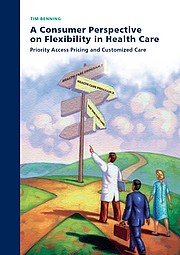A Consumer Perspective on Flexibility in Health Care: Priority Access Pricing and Customized Care Defended on Thursday, 30 June 2011
The rise of consumerism and the increasing availability of information through the Internet have increased patients’ demand for care that is more in line with their preferences. Because of this trend the expectation that hospitals act according to each individual patient’s preferences is becoming even more prominent. Hospitals could respond by implementing flexible health care policies that offer patients more choice.
In this dissertation we explore two types of flexible health care policies from the consumer perspective: priority access pricing and customized care. We do this by (1) investigating how consumers evaluate price-based priority access allocation policies (i.e., allocation policies in which patients are offered the option to pay extra for faster health care access), and by (2) demonstrating how the collective costs and benefits of customized health care policies (i.e., policies that offer individuals the possibility to “create” their own health care program) can be used to evaluate customized care. Throughout, special attention is given to the role of collective health outcomes.
Besides our scientific conclusions, our findings are also relevant for hospitals and policy makers that consider implementing new allocation policies. They can be used to provide assistance in future health care decision making.
Keywords
allocation, collective outcome, customized care, flexible policy, health care, individual outcome, priority access pricing, psychological distance, scarce resources










